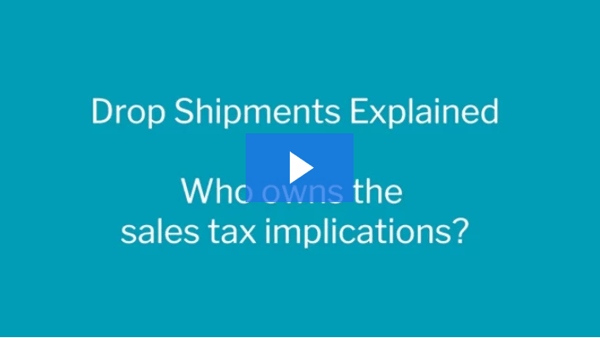 As if sales tax nexus and taxability rules weren’t confusing enough, throw in marketplace facilitators and drop shipments and it’s easy for a business of any size to want to give up on sales tax compliance.
As if sales tax nexus and taxability rules weren’t confusing enough, throw in marketplace facilitators and drop shipments and it’s easy for a business of any size to want to give up on sales tax compliance.
Understanding who owns the obligations when it comes to drop shipments is often confusing and involves knowledge of the nexus footprint of the business making the sale to the end-user as well as the nexus footprint of the drop shipper.
But understanding who is exempt for sales tax in a resale transaction involving drop shipments comes down to two distinct transactions when states are looking at it:
- The transaction between the retailer selling the product to the end-customer and the manufacturer/distributor that will be shipping it out; and
- The transaction between the retailer and the end-customer
The second scenario is a bit more straight forward and follows regular sales tax nexus rules, where the retailer is required to charge and collect sales tax once they’ve established nexus and registered within a state.
The first scenario is a bit more complicated though. The manufacturer/distributor should charge sales tax on the transaction if they have sales tax nexus in the state where they are drop shipping the product. Seems easy enough.
Where this becomes an issue for the retailer is that the retailer may not have sales tax nexus in the destination state or jurisdiction, and they do not charge sales tax to the end-customer. The retailer is caught in the middle and could be responsible for paying the sales tax to the manufacturer/distributor. At the same time, the customer may accrue use tax on the transaction seeing that the retailer did not charge them sales tax.
The answer is for the retailer to provide a resale exemption certificate to the manufacturer/distributor. Easier said than done in some states. In these drop shipment transactions, states tend to fall into two categories as to whether they will accept a resale exemption certificate from the retailer’s home state or whether the retailer needs to issue a resale exemption certificate from the destination state of the end-customer. States like Georgia, will accept the retailer’s home state resale exemption certificate while California requires a California resale exemption certificate.
States similar to California present a challenge as the only way to provide a valid resale exemption certificate is to register for sales tax purposes in the state. Once registered, the retailer is then required to collect and remit sales tax on all applicable transactions. At last count, there are approximately 10 states that require a retailer to be registered in a state in order to present a valid resale exemption certificate. So a retailer based in a single state, with no sales tax nexus other than their home state, could be required to register in states where they previously had no obligation to ensure they are able to provide valid resale exemption certificates in conjunction with drop shipment transactions.
Executing within the requirements for exempt or reselling status in a drop shipment transaction can be complicated and burdensome for both the retailer and the distributor. It’s often best to look to an expert to help you understand your requirements.
Learn more about Drop Shipment Scenarios in our quick video – or get in touch to learn how we can help you understand your current sales tax obligations.







.png?width=1200&height=628&name=2023%20logo%20with%20SOC%20and%20clearly%20rated%20(2).png)